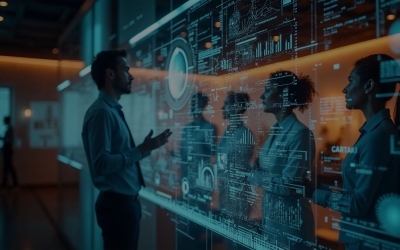The International Executive MBA is designed to solve the most critical challenges faced by leaders like you in a globalised and constantly changing business env
 Blog
BlogLifelong learning: The key to professional growth, adaptation and success
Remember the first time you learned to ride a bicycle, or the process of driving your first vehicle? Over time, you have probably learned to operate other modes of transport, perhaps even specialised machinery. As your needs have evolved throughout your life, you have also needed to acquire new skills to adapt and continue to grow.
In the workplace, the same is true. Lifelong learning has become essential for professional and personal development in a world where globalisation, digital transformation and artificial intelligence have profoundly changed the labour market.
Evolving demands in the professional sphere mean that both companies and workers need to get up to speed with lifelong learning. In this way, they can stay competitive and adapt to a constantly changing environment; otherwise, they may fall behind.
In this respect, educational institutions and human resources departments play a crucial role. They should aim to provide the support and resources necessary to foster a culture of continuous learning, where individuals can continue to develop and organisations benefit from up-to-date talent ready to meet the challenges of the future.

What does lifelong learning mean and why is it important to succeed in the labour market?
Lifelong learning refers to the process of continuous learning throughout life. In today's context, entry into the labour market is not the end of one's academic life, but extends and evolves throughout one's professional career. The key is to maintain an attitude of curiosity and openness to change in order to overcome new challenges through constant acquisition of knowledge and skills.
Today, companies are not looking for employees with only basic skills; it is essential that employees keep their knowledge up to date and are willing to learn on a continuous basis. Therefore, constant learning enables them to respond quickly to the changing demands of their roles and to contribute effectively to organisational success.
Moreover, this is a valuable tool for the professional development of employees. Acquiring new skills not only makes them more competitive in their current positions, but also opens doors to new opportunities and allows them to advance in the marketplace. Thus, development inside and outside the work environment becomes a direct and enriching benefit of this lifelong learning philosophy, fostering both personal and professional growth.

The role of human resources in lifelong learning
Human resources areas play a central role in the implementation of lifelong learning within organisations. No longer limited to recruiting or payroll, their mission has evolved to creating strategic plans that foster employee growth through lifelong learning. By fostering a culture of learning within the organisation, companies are creating a more skilled and motivated team, capable of meeting the challenges of today's marketplace.
Human resources departments can also collaborate with educational institutions and training providers to offer specific continuing education programmes. These programmes enable employees to acquire specialised skills in high-impact areas such as artificial intelligence, data analytics, and other digital competencies that are essential in the digital transformation.

Continuing education to drive professional development
As we have been saying, lifelong learning not only benefits organisations, but is an opportunity for individual development. By incorporating learning into everyday life, workers can naturally improve their competences throughout their lives.
This is particularly relevant in fields that are undergoing rapid technological change, where technical knowledge quickly becomes obsolete if it is not constantly updated. For example, in sectors such as digital marketing, software engineering or consulting, the implementation of AI systems and advanced tools requires professionals to regularly update their skills.
Organisations that invest in education for their teams achieve better prepared employees, but also create an environment where learning is an integral part of the company culture. This helps reduce staff turnover and increases engagement, as employees value the growth opportunities offered to them.
Challenges and opportunities in lifelong learning
Digitisation and the proliferation of advanced technologies, such as AI, represent both a challenge and an opportunity for lifelong learning. As these technologies advance, so does the demand for specific technological skills, from handling large volumes of data to understanding complex algorithms.
For this reason, lifelong learning becomes an essential requirement for those seeking to excel in the labour market. On the one hand, at the individual level, professionals should keep abreast of the demands of their field. Also, as we have mentioned, companies must implement technological tools, while providing the necessary training to use them efficiently.
On the other side, educational institutions must offer programmes specifically designed to prepare students and professionals for the jobs of the future. Without the vision of educational institutions, progress is impossible.
Moreover, lifelong learning allows workers to adapt to these changes proactively. Instead of waiting for new technologies to make them obsolete, they can anticipate, acquiring skills and knowledge that keep them relevant. Thus, lifelong learning becomes a tool for empowerment and job security, enabling employees not only to adapt to market transformations, but also to be active agents of change.


Agri-food is a strategic sector for both the national and international economies.



A company or organization that anticipates, identifies needs and threats, foresees, and makes strategic and operational decisions based on Comprehensive Risk Management



In ENAE Business School's Official Master in Logistics and Operations Management program, you will learn how to analyse the performance of a company's operation

Business decision-making can no longer be based on intuition.


Automated Marketing Reports: From ‘Excel paralysis’ to real ROI (Guide with Power BI, Looker and Tableau Templates)

Master's Degree in Logistics in Spain: Key Factors for Choosing a Leading Program
Daniel Román Barker
Marketing Specialist at ENAE Business School, where he is part of the team responsible for planning, producing and optimising digital content for the enae.es and enae.com websites, as well as for the school's various social media channels. Using the Drupal CMS, he manages the publication and updating of pages and articles, ensuring brand consistency, content quality and user experience.
He specialises in SEO and performance marketing, defining and implementing the organic content strategy with the support of tools such as Sistrix and Google Search Console to improve positioning and qualified traffic to master's programmes and executive courses. In addition, he designs, configures, and optimises online advertising campaigns on Meta, LinkedIn, TikTok, and Google Ads, aligning segmentation, messaging, and objectives with student recruitment. His work contributes to ENAE's organic and paid growth and strengthens its position as a leading business school nationally and internationally.













